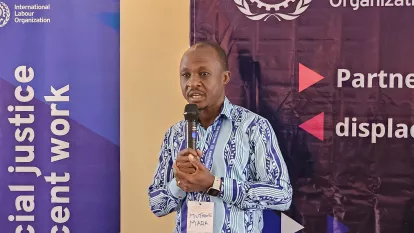International Labour Organization (ILO) successfully concluded a capacity-building training on Nature-Based Solutions (NbS). The event held recently in Addis Ababa, Ethiopia, brought together 38 participants from various government agencies and international organizations across Ethiopia, Uganda, Sudan, and Somalia.
The training was part of two ILO programs, PROSPECTS and KfW, and aimed to equip stakeholders with the knowledge and tools needed to integrate NbS into their development projects. The focus was on fostering sustainable livelihoods while simultaneously tackling pressing issues such as biodiversity loss, forced displacement, and climate change.
During the closing ceremony, Khumbula Ndaba, Director of the ILO Country Office for Ethiopia, Djibouti, Somalia, Sudan, and South Sudan, highlighted the importance of this training. “The significance of nature-based solutions in creating jobs and livelihoods cannot be overstated for countries in the sub-region,” he stated. “As we continue to face the impacts of climate change and poverty, it is essential to pursue innovative approaches that leverage our natural resources sustainably.”
Participants engaged in interactive group exercises, examining how to enhance employment potential through the integration of NbS into existing projects. This hands-on approach allowed them to brainstorm and design practical applications for their respective contexts.
To further enrich the training experience, participants visited Entoto Park, a prominent greening project in Addis Ababa, spearheaded by the city’s Urban Authority. The visit provided a real-world example of how environmental restoration efforts can generate employment opportunities.
Stephen Opio, Chief Technical Advisor for the ILO PROSPECTS program in Ethiopia, emphasized the importance of such initiatives: “Ethiopia’s efforts serve as a beacon of how countries can simultaneously address environmental and economic challenges. Witnessing the ongoing tree-planting exercise firsthand reinforced our understanding of how NbS can create jobs while benefiting the environment.”
The training fostered a strong sense of collaboration among participants, many of whom expressed their eagerness to apply their newfound knowledge. Mastoura Hamid Bushra, General Manager with Sudan’s Ministry of Labour and Administrative Reform, stated, “I am eager to work with the Ministry of Agriculture and other stakeholders to implement the lessons I learned from this workshop.” Similarly, Mutaawe Mark from Uganda’s Office of the Prime Minister noted the training’s practical approach, emphasizing the importance of long-term planning and local solutions.
Asfaw Kidanu, a Senior Employment-Intensive Investment Programme Specialist at ILO’s Pretoria office, reiterated the necessity of prioritizing both employment and environmental sustainability in policy-making. “Addressing climate challenges through collective action, with nature-based solutions at the core, is critical,” he affirmed.
In his concluding remarks, Ndaba urged participants to champion NbS within their organizations and communities. “By mainstreaming the lessons learned, we can develop regional solidarity that enhances nature conservation and job creation,” he said.
Uganda was well represented by Mutaawe Mark from the Office of the Prime Minister, department of refugees. He described the training as informative, engaging and practical. He said, “The training speaks about long-term planning and flexibility, as well as the application of local solutions to local problems”
The ILO’s NbS training not only empowered participants with essential skills but also sparked a renewed commitment to environmental stewardship and sustainable economic development in the face of climate change challenges. As these stakeholders return to their respective countries, the potential for impactful change in the region is promising, driven by a collective vision of a greener and more resilient future.
Do you have a story in your community or an opinion to share with us: Email us at editorial@watchdoguganda.com













